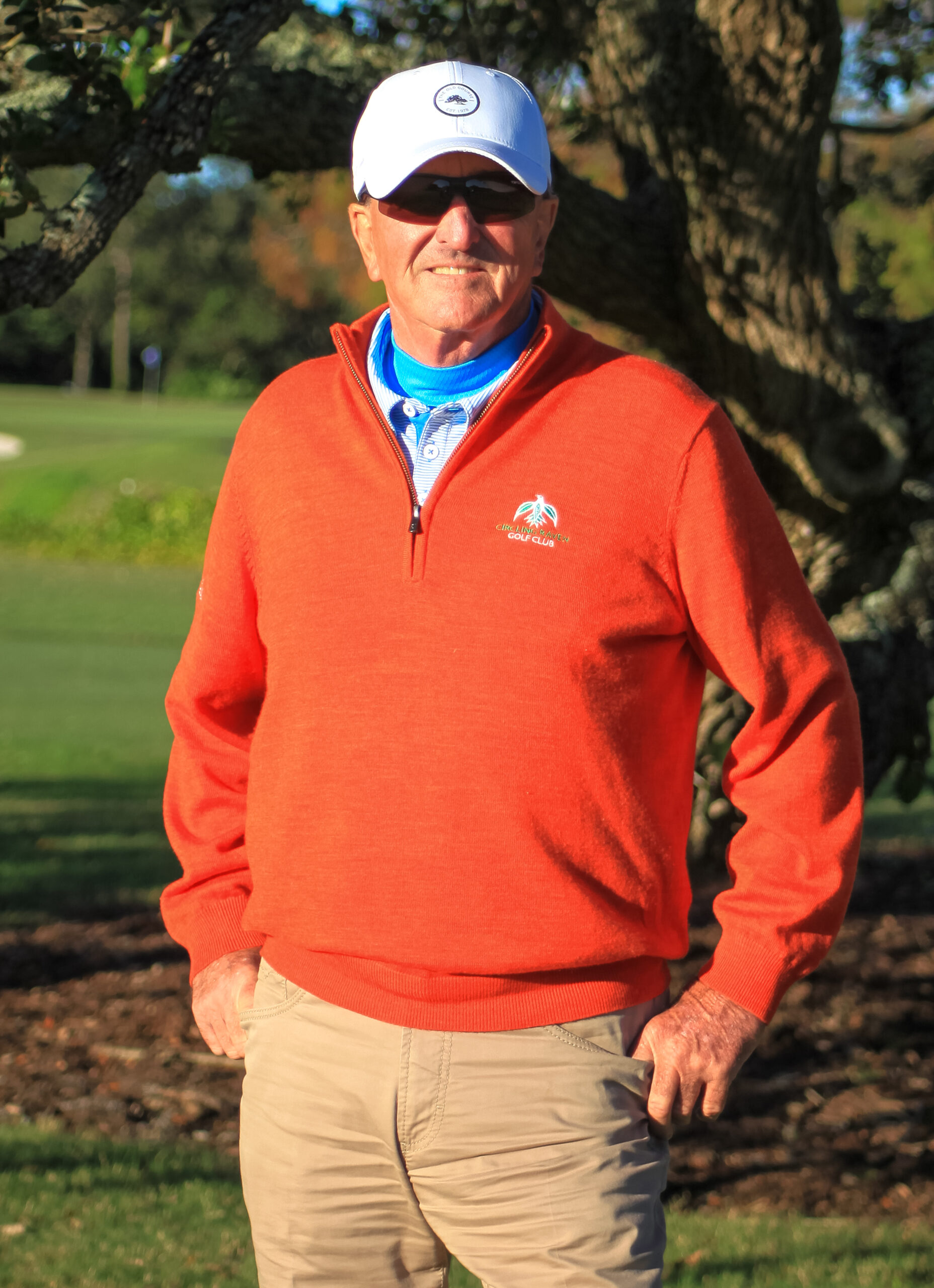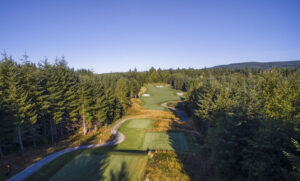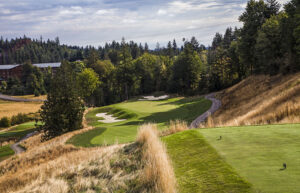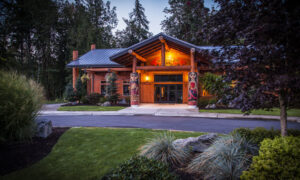Lofty Plans for Salish Cliffs Golf Club and Little Creek Casino Resort
by John R. Johnson
The Squaxin Island Tribe and Little Creek Casino Resort in Shelton, Wash. have set out on a commitment to keep its most high-profile amenity, Salish Cliffs Golf Club, atop the best golf courses not only in Washington State but also to stay on top of the ratings for top casino courses in the U.S. and to be recognized in the national rankings of all courses.
Not that the Gene Bates-designed layout, built on 320 acres with 600 feet of elevation change, has gone unnoticed in its 12 years of existence. Quite the contrary, the course and facilities have already collected numerous awards and media accolades since opening in 2011.
To name a few of their favorites:
- Best New Course in the U.S. for 2011 – Golfweek and Golf Digest
- Top 100 Public and Top 100 Resort Courses in the U.S.
- Top 10 Casino Courses in the U.S.
- Best Courses You Can Play – Washington
- No. 1-ranked Golf Course in Washington State
- No. 1- ranked Golf Course in Washington State for Amenities
- No. 1-ranked Pro Shop in Washington State
- World’s First Salmon-Safe Sanctuary Golf Course
The award-winning course is conveniently located an hour’s drive southwest of Seattle, or two hours north of Portland. Because of it being located in a temperate climate zone, the course is blessed with year-round playability.
So why create an aggressive new master plan to include the complete renovation of all 63 bunkers (at a cost of $2 million) plus the replacement of every bridge on the golf course when you are already at the top of the golf charts?
Two reasons: One, to stay on top, you have to continue to lead, improve and innovate. The tribal council is proud of their achievements and accolades, but by no means are they content with the status quo and have planned for continued growth and features well into the future.
And two: The Pacific Northwest can be a challenging weather location on course infrastructure. With four distinct seasons, it takes a toll on a facility, especially bunkers and wooden structures such as bridges. To remain as the best, you have to continuously maintain and improve the facility to a top-quality level.

Bates was the original architect and mastermind of this award-winning course, so the tribe has brought him back to contribute to the new master plan. It is an aggressive and impressive undertaking which may include the following:
- Rebuild all 63 bunkers with “Billy Bunker” materials for long-term resilience
- Rebuild all of the course bridges in a Pacific Northwest architectural style
- Improvement and expansion of the practice area and driving range
- Creation of a short-game practice area as part of the learning center
- Build a new 9- or 18-hole golf course to complement and bolster the current course
- Create multiple ponds and lakes to augment water storage, irrigation and course aesthetics
- Build a new clubhouse with an expanded banquet area to host events
- Create a series of golf course villa cabins for private parties and family stays
- Develop a golf academy for adults and tribal youth to develop lifetime skills
Every plan has to have their hands-on leaders, and for Salish Cliffs one of those would be their PGA Head Professional, Tyler Brown. Hailing from golf-rich California, he has the requisite golf professional skills, and he absolutely embraces the opportunity that Salish Cliffs offers. If there is one thing that really stands out, it would be his passion for the tribal members, and especially the tribal youth.
He sees the casino, hotel, amenities and golf course as a resort destination and a learning center for the tribal cultural customs of the Squaxin people.
“There is so much to do and learn here,” Brown says. “The hiking, biking, fishing, shellfish gathering, kayaking and potential guided tours are all mixed with a world-class spa and dining opportunities. The words ‘stay and play’ can extend far beyond just golf. As a corporate or family retreat, this is a place where multiple memories and learning opportunities can be made.”
This is a topic on which Brown becomes introspective, “We are a tribal project,” he says. “We are talking about building skills, community pride and lifetime jobs for our community. As we grow our resort, the amenities and programs, our tribal youth will be learning not only about their unique culture, but will also develop diverse job skills that make them employable anywhere in the world. I am proud to be part of creating that kind of opportunity.”
Another key member of the tribal management team is Raymond Peters, who has been deeply involved with the project from the early planning stages, through construction and then much of the past 12 years of the course’s maturation. His official title is Intergovernmental Affairs/Tribal Council Liaison, and he has been but one of the many important public faces representing the award-winning project from its inception.
Peters states that the original concept for the course and resort had many goals and points, with some of the key ones being:
- Add amenities to the resort to capture a new market demographic and enhance the gaming experience at the resort’s casino.
- Pay homage to the tribal land and culture, keeping it in a natural state for the tribe and existing wildlife to include the native salmon runs.
- Create meaningful long-term jobs, careers and recreation for both the tribal and local community residents, developing skills that can transfer to employment or recreational enjoyment worldwide.
- Expand the resort’s footprint from a primarily local facility to a regional/national facility, especially targeting Washington, Oregon, Idaho, California and our Canadian friends up north.
To accomplish these goals, the course had to be highly regarded in design and playability. Just as important, the course had to build an outstanding reputation for service, experience and maintenance conditions in order to build an exceptional reputation both locally and nationally. In looking at the list of awards mentioned above, they have accomplished that and more.
“The Tribal Council understands that to stay on top, you have to continue to excel and grow,” Peters says. “Just ‘maintaining’ will not work for the future. The new master plan is designed to maximize the resort experience, driving more people to the property. Whether that means expanding the practice facility, adding holes or beautifying the property with new bunkers, bridges, ponds or casitas, each step is calculated by the Council to stay true to the original goals. This is what drives the overall resort concept, and it is a key component of the next step in developing the master plan for Salish Cliffs.”
As for the new changes, Bates is looking forward to working with both the golf staff and tribal leaders to take an existing award-winning facility to a whole new level. Remaking all 63 bunkers is a huge project, and it will allow Bates to connect with his longtime friend and construction partner, Bob Pearsall, who was the lead driving force on the original course construction.
Nobody knows the course better than Pearsall, who has been the on-course superintendent and is virtually responsible for all the awards bestowed on the property over the past 12 years.
Teaming Bates and Pearsall together again means nothing but good things are about to happen at Salish Cliffs.
The next few years are going to see some incredible changes that are sure to draw a national following to augment an already appreciative local golf patron base.
The Pacific Northwest and the state of Washington are setting the stage as the next big Mecca for quality golf, vacations and cultural experiences. The region is nationally known as a “bucket-list” beautiful place to visit, that is soon to become an even more desirous destination. If you are a golfer living in the Pacific Northwest, your golf game is about to get better.
John R. Johnson is one of the golf industry’s premier photographers, His work has been featured in countless books, magazines, posters and calendars, including “Golf Courses of the PGA Tour.” He has been named “Golf Photographer of the Year” multiple times. Visit Golfphotos.com.









